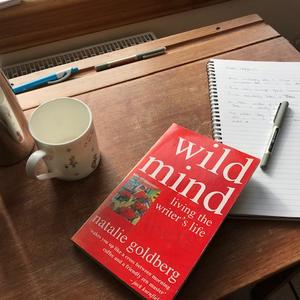How to Write When You Can't Write
6th April 2020
This is not about writers' block. It's not about how to deal with a difficult plot line or develop a character you're unsure about. It's just about being stuck.
We all know about it. The blank page or screen, the blank mind, the feeling that really, being an artist or a musician must be easier than being a writer, conjuring something out of nothing. It might happen when you sit down to write something new, or when you're in the middle of a long story or a novel. There is a slump in the middle of every novel, when you realise it's all terrible and you have no idea why you thought this would be even interesting, never mind great literature.
Then there is anxiety-related stuck-ness. Right now, with so much going on in the outside world we are simultaneously cut off from, the world that gives us our raw material, right now when we're all living through a crisis whose end we can't see and over which we have no control: it's hard to write. How do you still your mind and turn inward, not to that seething anxiety that kept you awake for hours in the night, but to your own creative space and the richness of your imagination?
The current situation is throwing up other difficulties too. You might have young children at home, which means anything more creative than home-made playdough is a lost cause. You might have a houseful of teenagers, making it hard to work in silence or listen to your own music instead of theirs. You might feel as if you're spending most of the day feeding everyone, and there's not even the prospect of an outing to Pizza Express instead.
Writers have lives and families and are just as prone to anxious insomnia as anyone else, but we also know that too long without writing induces a state of twitchiness and dissatisfaction. Something important is missing.
So, without claiming these are perfect solutions (in the end you'll have to find what works best for you), here are some ideas to help you get writing again.
- 1.Do something else. This sounds daft, but it is oddly effective. Bake a cake, dig in the garden, tidy a cupboard (I realise that one is a bit extreme, but sometimes these measures are called for), or wash the car. In other words, do something physical that doesn't require much thought. It's important this is something not at all interesting. Don't listen to music or the radio, don't distract yourself. Let your mind wander, then bit by bit, bring it back firmly to your story or whatever you're in the middle of writing. You will think of a sentence, a fragment, an idea, a snatch of dialogue, and eventually, you'll fling down the duster or whatever dull thing you're occupied with, and go back to the page or the screen. Write it down quick, before it goes.
- 2.Write at a different time. If you can't write during the day, do it early in the morning, late in the evening, or even in the middle of the night. If you can't get back to sleep, you can at least make use of the time. It doesn't matter if it's only a sentence or two at first – the oddness of the hour can spark a different kind of thinking.
- 3.Write somewhere else. This is limited just now, as we can't go to cafés or parks, libraries or art galleries. So you might be reduced to the loft or the spare bedroom, or the cupboard under the stairs. But being somewhere else makes you feel different, and it can work. Not that I recommend spending much time in the cupboard under the stairs – if yours is anything like mine you will be crammed next to the vacuum cleaner and a vast amount of stuff you keep meaning to sort out…
- 4.Write something completely different. If you're a novelist, write a poem; if you write traditional, try SF or Fantasy; if you write fiction, try non-fiction. All these, even if they go nowhere and never get completed, keep the writing muscle working and flexible.
- 5.Set yourself a time limit. What can I write in ten minutes? Answer might well be nothing, and you end up going off to make another cup of tea. But the next ten minutes you try might be more fruitful.
- 6.Write a journal/diary – write down what is happening and what you're feeling. You can probably cover pages like this.
- 7.Have a break. Give yourself permission to write absolutely nothing at all for a week, a fortnight, whatever you need. Sometimes you need to recharge flat batteries and gradually build up your bank of material, ideas and dreams.
I wrote a piece last year about the importance of not writing, which seems a little ironic now, but in the main, it still holds good – a break from writing is fine, just don't let it go on too long!
